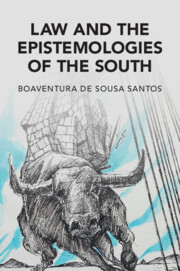Book contents
- Law and the Epistemologies of the South
- CAMBRIDGE STUDIES IN LAW AND SOCIETY
- Law and the Epistemologies of the South
- Copyright page
- Contents
- Preface
- Abbreviations
- Part One The Tragic Optimism of the Law: THE END OF A STORY
- Part Two Epistemologies of the South and the Law
- Five Introducing the Epistemologies of the South
- Six The Epistemologies of the South and Law: Towards a Post-Abyssal Law
- Seven Is Post-Abyssal Law Possible?
- Part Three The Abyssal Law under the Mode of Abyssal Exclusion
- Part Four Real Legal Utopias: Interrupting the State
- Part Five Real Legal Utopias: Interrupting the Law
- Part Six Real Legal Utopias: Interrupting Hegemonic Human Rights
- References
- Index
- Cambridge Studies in Law and Society
Five - Introducing the Epistemologies of the South
from Part Two - Epistemologies of the South and the Law
Published online by Cambridge University Press: 07 August 2023
- Law and the Epistemologies of the South
- CAMBRIDGE STUDIES IN LAW AND SOCIETY
- Law and the Epistemologies of the South
- Copyright page
- Contents
- Preface
- Abbreviations
- Part One The Tragic Optimism of the Law: THE END OF A STORY
- Part Two Epistemologies of the South and the Law
- Five Introducing the Epistemologies of the South
- Six The Epistemologies of the South and Law: Towards a Post-Abyssal Law
- Seven Is Post-Abyssal Law Possible?
- Part Three The Abyssal Law under the Mode of Abyssal Exclusion
- Part Four Real Legal Utopias: Interrupting the State
- Part Five Real Legal Utopias: Interrupting the Law
- Part Six Real Legal Utopias: Interrupting Hegemonic Human Rights
- References
- Index
- Cambridge Studies in Law and Society
Summary
In this and the following chapters I introduce the epistemologies of the South and analyse how they have changed my sociological approach to law. In the first decades of the new millennium, we need to create a distance in relation to Western-centric critical social and legal thinking and, more generally, the epistemologies on which it is grounded. The new coronavirus pandemic has only made this need all the more visible and urgent. This century has begun with the pandemic inscribing itself in peoples’ lives in a new way, regardless of which part of the globe they happen to inhabit even though with glaring differences in losses of human life. Dominant epistemologies and theories do not adequately account for the specific “moment of danger” we are entering and consequently will not offer much help with the challenges we will face in the coming decades. The aim of creating a distance in relation to the Western-centric tradition is to open up analytical spaces for realities that have been ignored or made invisible for many centuries. Such realities can only be retrieved by the epistemologies of the South. Two basic ideas sustain the epistemologies of the South: the understanding of the world by far exceeds the Western understanding of the world; the cognitive experience of the world is extremely diverse and the monopoly of rigorous knowledge granted to modern science has entailed a massive epistemicide (the destruction of rival knowledges deemed to be non-scientific) that now calls for reparation. As a result, there is no global social justice without global cognitive justice.
Keywords
- Type
- Chapter
- Information
- Law and the Epistemologies of the South , pp. 85 - 117Publisher: Cambridge University PressPrint publication year: 2023



